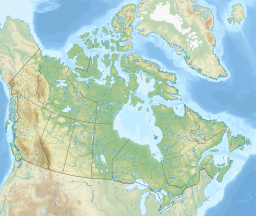
Summary
Manitou Lake[2] is a salt lake located mostly in the RM of Manitou Lake No. 422 in the Canadian province of Saskatchewan, about 10 kilometres (6.2 mi) east of the provincial border with Alberta. The eastern shore of the lake is in the RM of Hillsdale No. 440. Manitou Lake is located in a region called the Prairie Pothole Region of North America, which extends throughout three Canadian provinces and five U.S. states. It is also within Palliser's Triangle and the Great Plains ecoregion. Manitou Lake is part of an Important Bird Area (IBA) of Canada that covers 699.66 km2 (270.14 sq mi) of land and serval neighbouring lakes.
| Manitou Lake | |
|---|---|
 North-West Bay | |
 Manitou Lake Location in Saskatchewan  Manitou Lake Manitou Lake (Canada) | |
| Location | RM of Manitou Lake No. 442, Saskatchewan |
| Coordinates | 52°43′N 109°43′W / 52.717°N 109.717°W |
| Type | Salt lake |
| Primary inflows | Eyehill Creek |
| Primary outflows | None |
| Basin countries | Canada |
| Surface area | 8,000 ha (20,000 acres) |
| Max. depth | 25 m (82 ft) |
| Shore length1 | 91.1 km (56.6 mi) |
| Surface elevation | 591 m (1,939 ft) |
| Islands | Manitou Island |
| Settlements | Marsden, Neilburg |
| References | [1] |
| 1 Shore length is not a well-defined measure. | |
Because the lake is an endorheic lake[3] and quite salty, there are no fish in the lake. Manitou Island in the centre of the lake is now connected to the southern shore as the water level has lowered.[4]
Description edit
The primary inflow for the lake is from Eyehill Creek[5] at the south end. There are also many small springtime meltwater tributaries that feed the lake. Eyehill Creek originates in neighbouring Alberta from Sounding Lake. Manitou Lake and its tributaries are part of a closed basin watershed. When the lake level rises high enough, it overflows to the north through Wells Lake near Marsden and then into the Battle River, which is a tributary of the North Saskatchewan River. This has happened only once since settlers arrived in the area, and that was in approximately 1905.
Lake levels were relatively constant until 1980 and have been declining rapidly since then by approximately one metre every six years. Less annual snowfall and heavier utilization of water from the Eyehill Creek system by urban, industrial, and agricultural users is blamed for this trend.
Along the southern shore of the lake are the Manitou Sand Hills. The hills total 420 km2 (105,000 acres) of Crown grazing land set aside by the Saskatchewan government.[6]
There are no communities on the lake's shore. The nearest communities are Marsden, about 6.5 kilometres (4.0 mi) north of the north-west corner of the lake in the RM of Manitou Lake, and Neilburg, about 6.5 kilometres (4.0 mi) north of the north-east corner of the lake in the RM of Hillsdale, along Highway 40. At the lake's North-West Bay, there is Big Manitou Regional Park.[7] Originally founded as part of Suffern Lake Regional Park[8] in 1975, it became its own independent regional park in 2019. The park features camping, cabins, picnicking, swimming, and the Manitou Lake Golf Club. Just to the east of the regional park, is Manitou Lake Bible Camp.
Manitou Lake Area IBA edit
The Manitou Lake Area (includes Reflex, Freshwater, Wells, Colette and Cipher Lakes) (SK 089) IBA of Canada encompasses Manitou Lake itself and several smaller nearby lakes—including two in Alberta. It also covers the 7252-hectare Artland Sandhills, which are to the west of Manitou Lake. Freshwater and Wells Lakes are entirely within Saskatchewan, and Cipher and Colette are in Alberta. Reflex Lake staddles the border. The lakes are important habitat for birds such as the piping plover, red-necked phalarope, sanderling, stilt sandpiper, ruddy turnstone, redhead, red knot, lesser scaup, and the dunlin. Around Manitou Lake, six specific areas covering over half the shoreline have been "designated as critical Piping Plover habitat", which protects the shoreline up to the highwater mark from development.[9]
See also edit
References edit
- ^ "IBA Canada (Community Conservation Plan for the Manitou Lake Important Bird Area)" (PDF). 2001. Archived from the original (PDF) on 6 February 2015. Retrieved 6 February 2015.
- ^ "Manitou Lake". Canadian Geographical Names Database. Government of Canada. Retrieved 11 April 2023.
- ^ "Battle River Watershed". Battle River Watershed. Battle River Watershed Alliance. Retrieved 1 May 2023.
- ^ "Manito Lake Fishing Map". GPS Nautical Charts. Bist LLC. Retrieved 1 May 2023.
- ^ Government of Canada, Natural Resources Canada. "Place names - Eyehill Creek". www4.rncan.gc.ca.
- ^ "MINISTERS RELEASE MANITOU SAND HILLS INTEGRATED LAND USE PLAN | News and Media".
- ^ "Big Manitou". Regional Parks of Saskatchewan. Saskatchewan Regional Parks. Retrieved 30 May 2023.
- ^ Government of Canada, Natural Resources Canada. "Place names - Suffern Lake Regional Park (Manitou Section)". www4.rncan.gc.ca.
- ^ "Manito Lake Area (includes Reflex, Freshwater, Wells, Colette and Cipher Lakes)". IBA Canada. Birds Canada. Retrieved 1 May 2023.
External links edit
- Media related to Manitou Lake (Saskatchewan) at Wikimedia Commons


